WHO continues large-scale malaria response across Yemen
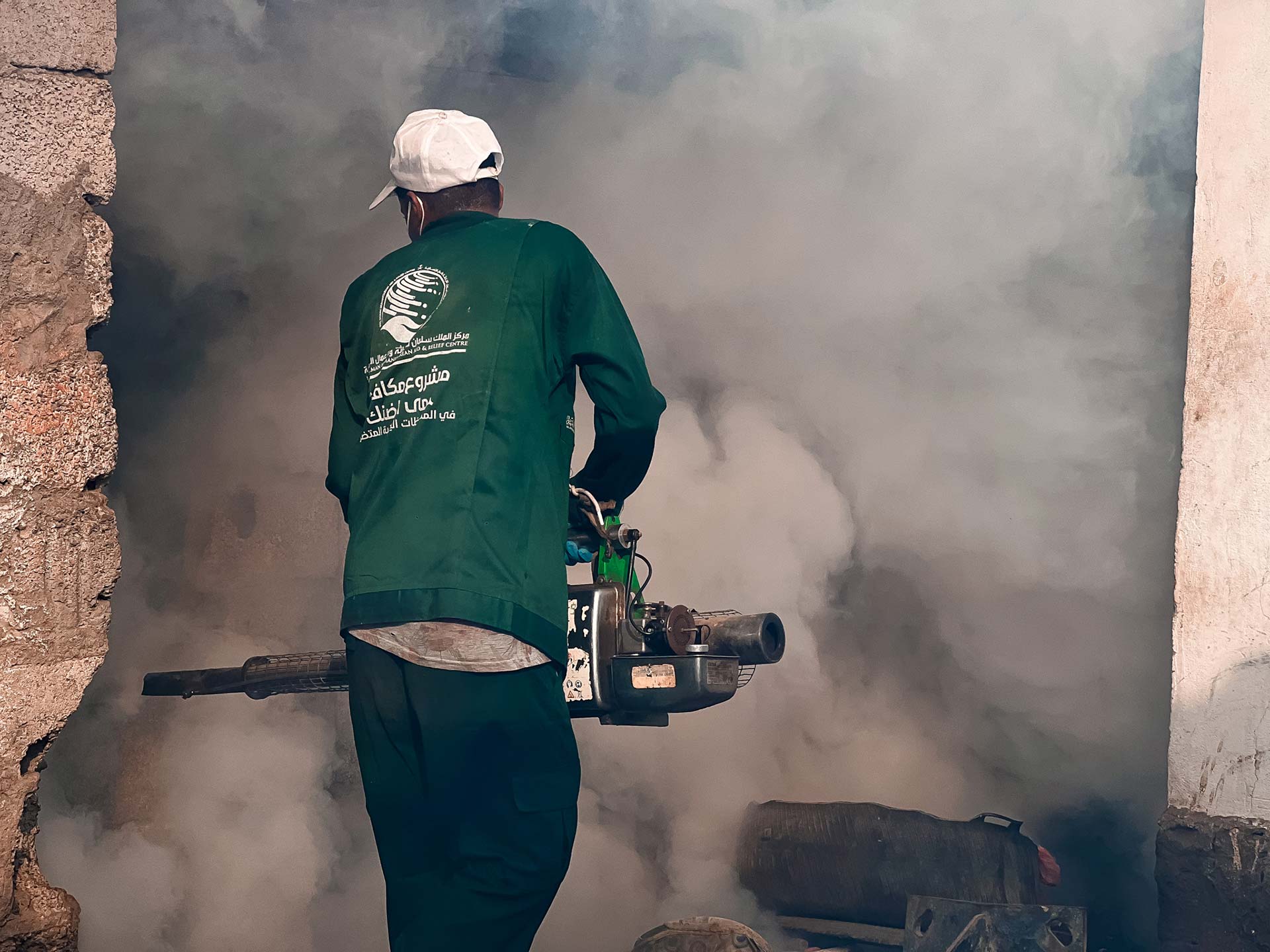 A comprehensive emergency vector control campaign in targeted districts in Yemen. Photo credits: WHO Yemen/ Nesma Khan23 February 2026, Aden,Yemen - The World Health Organization (WHO), with the generous support of the King Salman Humanitarian Aid and Relief Centre (KSrelief), is currently implementing Phase 2 of a project to strengthen malaria control and prevention in Yemen, expanding life-saving malaria and arboviral disease interventions across 15 governorates and more than 200 districts nationwide.
A comprehensive emergency vector control campaign in targeted districts in Yemen. Photo credits: WHO Yemen/ Nesma Khan23 February 2026, Aden,Yemen - The World Health Organization (WHO), with the generous support of the King Salman Humanitarian Aid and Relief Centre (KSrelief), is currently implementing Phase 2 of a project to strengthen malaria control and prevention in Yemen, expanding life-saving malaria and arboviral disease interventions across 15 governorates and more than 200 districts nationwide.
Running from March 2025 to February 2028, the project’s goal is to strengthen prevention, surveillance and case management services in high-risk and epidemic-prone areas, prioritizing pregnant women, children under-5, internally displaced persons (IDPs), refugees, migrants and communities in hard-to-reach locations.
Ongoing interventions reaching millions
The project is expected to benefit 8.7 million people, through an integrated package of interventions designed to reduce malaria-related morbidity and mortality and contain outbreaks of dengue and other arboviral diseases.
Activities currently underway include:
- distribution of malaria rapid diagnostic tests and laboratory supplies to strengthen early detection and confirmation of malaria and dengue
- provision of essential antimalarial medicines, ensuring timely treatment for uncomplicated and severe malaria cases
- reactivation of quality assurance/quality control systems for malaria microscopy in targeted health facilities to improve diagnostic accuracy
- expansion of integrated community case management, including training and supervision of community health volunteers to increase access to testing and treatment in remote districts
- implementation of indoor residual spraying in prioritized high-burden and epidemic-prone areas
- establishment of continuous distribution of insecticide-treated nets through antenatal care and immunization services to protect pregnant women and infants
- strengthening of integrated entomological surveillance in 16 sentinel sites to monitor mosquito vectors and guide targeted control measures
- deployment of mobile teams to deliver surveillance and case management services in IDP sites and high-risk border areas.
Malaria and arboviral diseases remain significant public health threats in Yemen, particularly in areas affected by displacement, environmental changes and limited access to essential services. Sustained surveillance and targeted vector control remain critical to preventing outbreaks and protecting vulnerable communities.
“WHO remains committed to ensuring that the most vulnerable populations have access to timely diagnosis, effective treatment and proven prevention tools,” said Dr Syed Jaffar Hussain, WHO Representative in Yemen. “Through strengthened surveillance and community-based services, we are helping to reduce the burden of malaria and other arboviral diseases across the country.”
WHO expresses its sincere appreciation to the King Salman Humanitarian Aid and Relief Centre (KSrelief) for its continued support to malaria control and prevention efforts in Yemen, enabling the delivery of these life-saving interventions to millions of people at risk.
Media contacts
WHO Yemen Communications
Email:
About WHO
Founded in 1948, the World Health Organization (WHO) is the United Nations agency dedicated to promoting health, keeping the world safe and serving the vulnerable. WHO leads global efforts to expand universal health coverage, coordinate responses to health emergencies and advance well-being for all.
Strengthening civil society leadership and institutional safeguarding systems
22 February 2026, Aden, Yemen – Over the past three years, WHO Yemen has led a transformative initiative to strengthen civil society capacity to prevent and respond to sexual exploitation, abuse and harassment (SEAH), embedding accountability, protection and dignity into health and humanitarian service delivery.
Through an integrated approach combining prevention of and response to sexual exploitation and abuse (PRSEAH), gender-based violence (GBV), gender equity and human rights (GER), and mental health and psychosocial support (MHPSS), WHO has supported a shift from awareness to institutional change.
In 2024, 56 civil society organizations (CSOs) participated in a national safeguarding working session. In 2025, more specialized trainings expanded engagement to over 60 CSOs, with more than 650 participants trained cumulatively. Importantly, 23 CSOs were supported to develop and institutionalize tailored PRSEAH policies – marking a milestone in strengthening internal accountability systems. Additionally, 69 staff members received bystander intervention training to reinforce proactive prevention.
“For the first time, we understand how to develop and improve our own PRSEAH policy. This has strengthened our credibility with staff and communities,” said a CSO safeguarding focal point in 2025.
These efforts have strengthened governance structures, clarified reporting pathways and increased organizational responsibility across the civil society sector.
Expanding community protection and safer health services
WHO-supported implementing partners expanded PRSEAH awareness at community level across multiple governorates. In 2024 alone, 659 community members (410 women and 249 men) were engaged in PRSEAH-focused activities, while 229 partner staff were trained on SEAH prevention.
Parallel efforts focused on strengthening protection within health facilities. Throughout 2024–2025, dozens of facilities established confidential, survivor-centred reporting mechanisms, reinforcing professional conduct and early risk identification.
As health workers became better equipped to respond safely and appropriately to disclosures, facilities reported greater confidence among communities – particularly women and vulnerable groups – in seeking care.
In just three years, WHO Yemen and its partners have laid the foundation for safer, more accountable systems. Continued investment in civil society leadership and safeguarding mechanisms remains essential to sustain trust, uphold dignity and ensure protection across Yemen’s health response.
Saving lives amid escalating conflict in Yemen
18 February 2026 – In 2025, between March and October, as conflict intensified across Yemen, repeated air and naval strikes placed immense pressure on health facilities in Sana’a, Hodeida, Taiz and other affected governorates. Hospitals experienced a surge in trauma cases, critical shortages of essential medical supplies and disruptions to emergency referral services – severely constraining access to life-saving care for communities caught up in the violence.
In response, the World Health Organization (WHO) rapidly scaled up its emergency response to sustain critical health services across the country. It delivered more than 3210 metric tons of essential medical supplies, including intravenous fluids, trauma emergency surgical kits, interagency emergency health kits, blood bags and laboratory reagents to major hospitals nationwide. These supplies enabled health facilities to continue emergency surgeries, blood transfusions and essential diagnostic services during peak periods of need.
To further reinforce emergency care, WHO provided support to 12 surgical teams across 8 governorates and strengthened referral pathways by funding the operation of 13 ambulances in Sana’a, Hodeida and Taiz. In parallel, 432 health workers were trained in mass casualty management and basic life support, while a 1-year national emergency medical teams framework was developed to strengthen coordinated emergency response.
Following further escalation in the southern governorates in December 2025, WHO delivered an additional 2.8 metric tons of trauma and emergency health kits, supporting 1900 surgical interventions and care for 20 000 patients. WHO also provided fuel to 11 health facilities in Hadramout, ensuring the continuity of life-saving services amid power disruptions.
“WHO’s support has enabled our surgical team to provide better care to patients arriving with severe trauma or in critical condition. Despite ongoing challenges and shortages, this support allows us to save lives every day. With continued investment in medicines, equipment and trained staff, we can strengthen this emergency centre and ensure life-saving care for the community,” says Dr Abduljaleel Hasan, an anaesthesia technician with the surgical emergency team Al-Thawra Hospital in Taiz.
As conflict persists and needs continue to rise, protecting Yemen’s health system is a life-saving imperative. Sustained, flexible funding is urgently needed to keep hospitals functioning, maintain emergency referral services and ensure health workers can respond swiftly to future escalations and save lives.
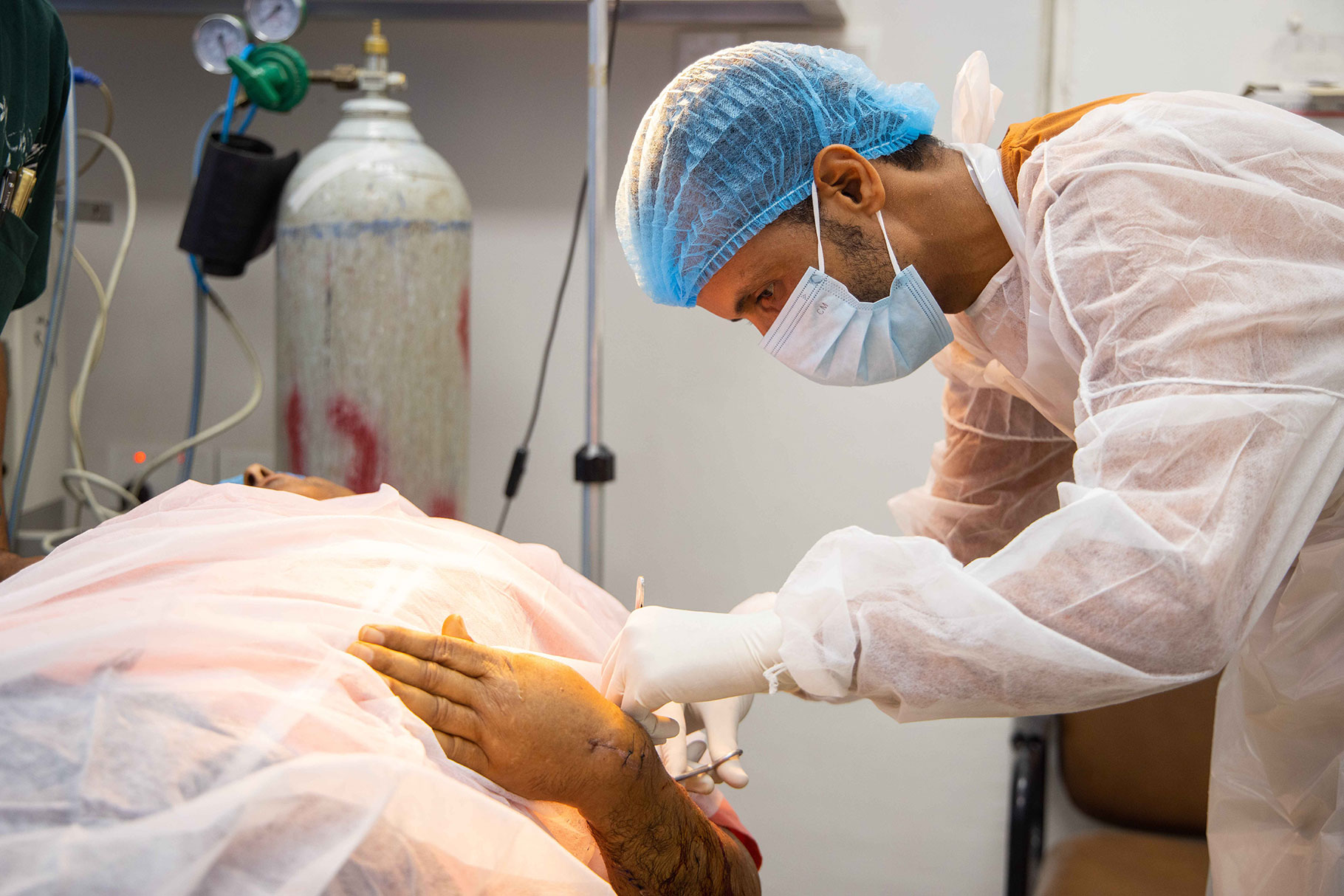 The medical team at Al-Thawra Hospital performs a surgical operation. Credit: WHO Yemen/2025
The medical team at Al-Thawra Hospital performs a surgical operation. Credit: WHO Yemen/2025
Protecting health amid floods and disease risks
In August 2025, heavy rains and flash flooding swept across 10 governorates in Yemen, compounding an already fragile humanitarian situation and sharply increasing public health risks. Floodwaters damaged infrastructure, displaced families and created conditions conducive to the spread of water-borne and vector-borne diseases, placing severe pressure on overstretched health facilities struggling to meet rising needs.
In response, the World Health Organization (WHO) rapidly mobilized life-saving support to sustain essential health services and prevent secondary health emergencies. WHO supported major hospitals with 136 metric tons of essential medicines and medical supplies, 108 units of critical medical equipment and 139 810 bottles of intravenous fluids, enabling health facilities to provide timely treatment for 27 762 patients affected by injuries, acute illnesses and complications linked to flooding.
To mitigate the heightened risk of disease outbreaks, WHO strengthened entomological surveillance and supported preventive interventions, including the provision of malaria and dengue medicines, rapid diagnostic tests and insecticides for indoor residual spraying and larvicidal campaigns in high-risk areas. These measures helped reduce transmission risks and supported early detection and response to priority diseases.
As climate-related emergencies continue to increase in frequency and severity, sustained and predictable support remains critical to protect lives, prevent outbreaks and strengthen Yemen’s capacity to anticipate, withstand and respond to future climate shocks.
 Floodwaters inundate a residential area in Yemen, leaving standing water and debris that pose health and safety risks for affected communities. Credit: WHO Yemen/2025
Floodwaters inundate a residential area in Yemen, leaving standing water and debris that pose health and safety risks for affected communities. Credit: WHO Yemen/2025
Strengthening disease surveillance and outbreak response
Amid fragile health conditions, WHO strengthened Yemen’s capacity to detect, prevent and respond to recurrent disease outbreaks during the year. WHO provided technical and operational support to disease surveillance and rapid response teams, including 1974 rapid response kits, enabling 1565 staff at central, governorate and district levels to verify alerts, investigate outbreaks and deliver early response interventions. WHO also supported the Electronic Integrated Disease Early Warning System and sentinel sites nationwide to strengthen epidemiological data collection and verification.
To improve cholera case management, WHO supported the operation of 27 diarrhoea treatment centres, managing more than 56 600 severe cholera cases, and trained 781 health workers on integrated outbreak case management.
“At the peak of the cholera outbreak, WHO’s support allowed us to treat severe cases quickly and effectively,” says Dr Saleh Al-Dobahi, technical supervisor at Al-Saddaqa Hospital, Aden. “With the medicines, supplies and training provided, we were able to save lives that would otherwise have been lost.”
WHO further strengthened outbreak prevention through supporting Yemen’s first national risk communication and community engagement strategy and oral cholera vaccination campaigns that reached over 3 million people. As disease threats persist, sustained and flexible funding is critical to maintain surveillance, rapidly contain outbreaks and protect lives across Yemen.
 Photo caption: A cholera patient receiving care from medical staff. Credit: WHO Yemen/2025
Photo caption: A cholera patient receiving care from medical staff. Credit: WHO Yemen/2025
Strengthening emergency preparedness
To strengthen Yemen’s preparedness for public health emergencies and emerging disease threats, WHO enhanced integrated, multisectoral coordination through the One Health approach, while reinforcing public health emergency operations centres (PHEOCs). WHO provided technical support to activate multisectoral One Health coordination mechanisms, strengthening core International Health Regulations (IHR) and Performance of Veterinary Services (PVS) capacities, with a focus on surveillance, laboratories and workforce development. The activation of the Zoonotic Diseases Technical Committee further improved early warning and information sharing among health, veterinary and environmental stakeholders.
In parallel, WHO supported emergency coordination by building the capacity of 33 national professionals on incident management through PHEOCs and initiated preparations for training on electronic public health emergency management to strengthen emergency reporting and event-based surveillance systems.
As health threats become increasingly complex and interconnected, sustained investment in coordinated preparedness systems is essential to protect communities, detect risks early and ensure rapid, effective responses to future public health emergencies in Yemen.
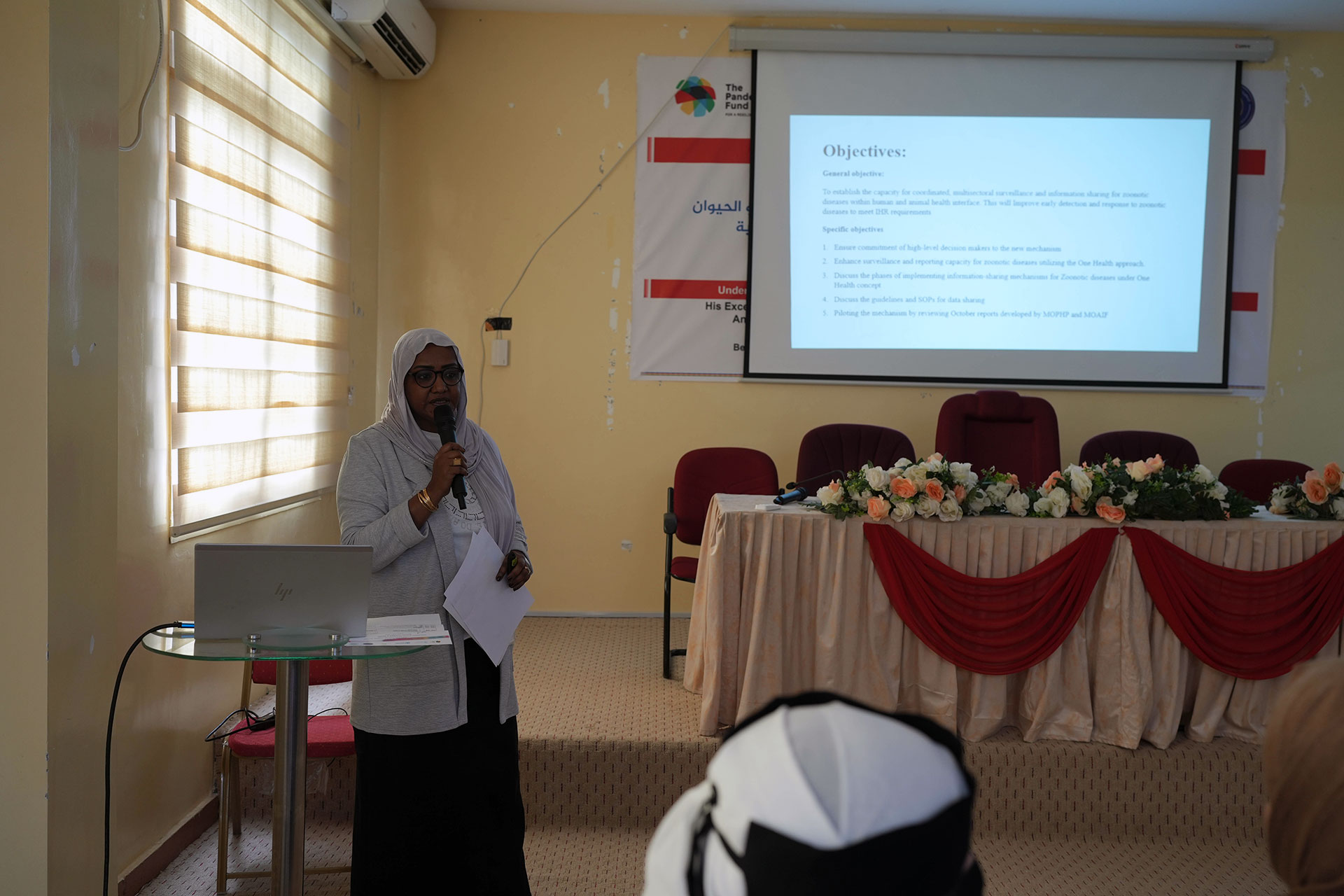 One Health workshop on information-sharing mechanisms for zoonotic diseases. Credit: WHO Yemen/2026
One Health workshop on information-sharing mechanisms for zoonotic diseases. Credit: WHO Yemen/2026
Strengthening laboratory and blood bank services
To enhance disease detection and ensure life-saving diagnostic and transfusion services, WHO strengthened public health laboratories and blood banks across Yemen during 2025.
WHO fully equipped 12 laboratories with essential diagnostic machinery, reagents, media and consumables, as well as integrated solar power systems to ensure uninterrupted laboratory operations amid chronic power disruptions. Field assessments were also completed to support the upgrading of general laboratories in Socotra and Al-Baidha governorates to full central public health laboratory status.
Supplies were secured for the specialized diagnosis of cholera, diphtheria, dengue and other respiratory and arboviral threats, including molecular tests, culture media and antimicrobial sensitivity testing kits. Capacity for water and food testing was strengthened to address the underlying drivers of recurrent outbreaks.
In parallel, WHO ensured a continuous supply of blood bags and consumables to blood banks, supporting trauma care and emergency surgeries.
“Strengthening laboratory and blood bank capacity is fundamental to early detection and effective response to health threats,” says Dr Wahid Al-Bakhishi, General Director of central public health laboratory in Aden. “WHO’s support has significantly improved our ability to deliver reliable diagnostics and life-saving services, even under extremely challenging conditions.”
WHO also supported the capacity-building of 240 laboratory professionals, including in the use of digital systems. Sustained investment is essential to safeguard surveillance systems, sustain critical services and protect lives across Yemen.
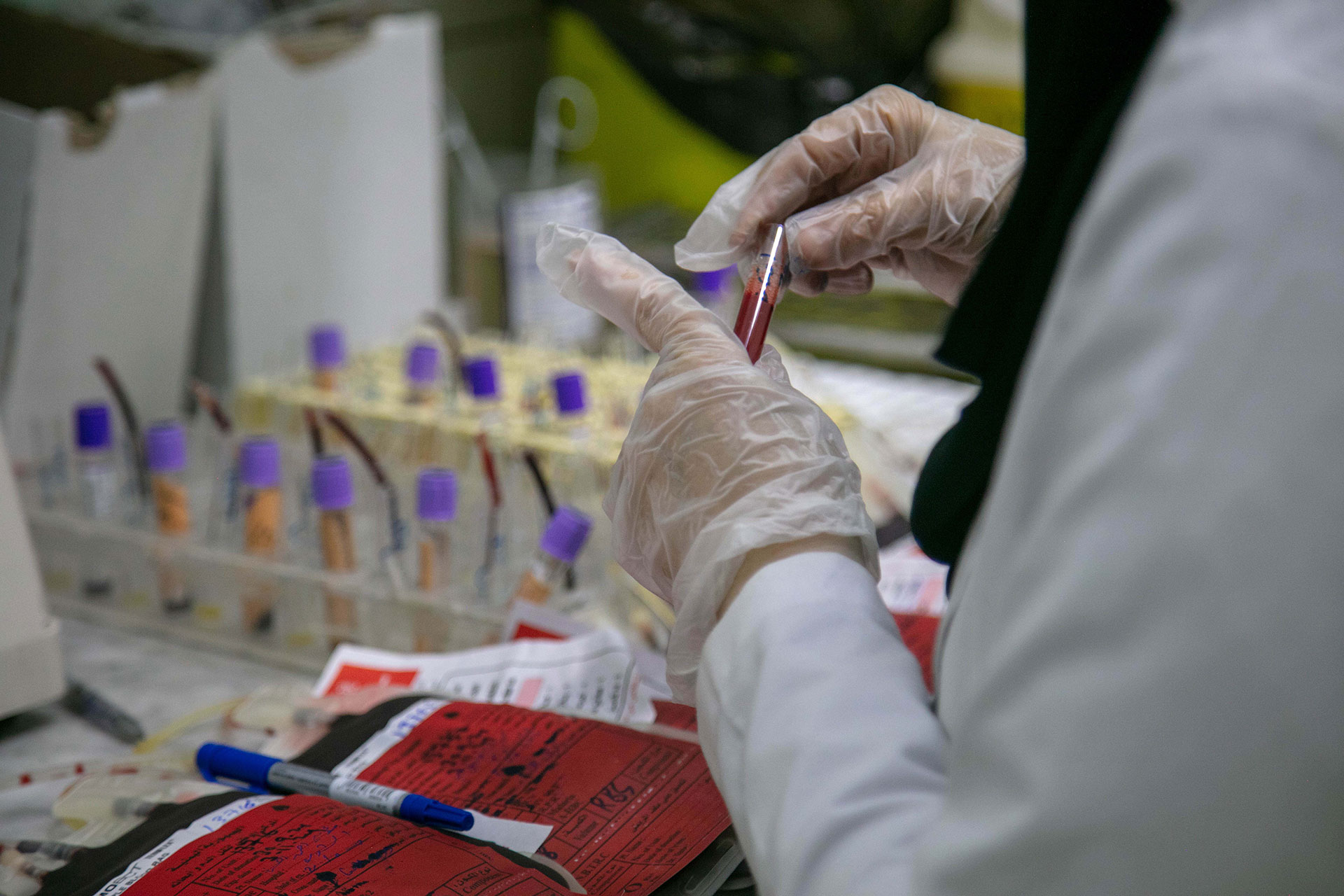 Blood samples being processed for testing. Credit: WHO Yemen/2025
Blood samples being processed for testing. Credit: WHO Yemen/2025
Saving lives where care must not stop
During 2025, WHO provided a direct lifeline support of essential utilities to the referral health facilities across Yemen, ensuring continuity of life-saving care. This included the delivery of approximately 3.96 million liters of medical oxygen to 52 health facilities in northern governorates, supporting the treatment of critically ill patients and emergency cases. To sustain facility operations and power generators for essential medical equipment, WHO supplied around 4.33 million liters of fuel to 177 health facilities nationwide (129 in the north and 48 in the south). In parallel, to strengthen infection prevention and control and maintain a safe care environment, WHO delivered approximately 41.27 million liters of safe water to 68 health facilities.
The health facilities supported through this intervention constitute a critical backbone of Yemen’s healthcare infrastructure. Collectively, they serve a catchment population of more than 20 million people across all governorates, providing a substantial level of clinical capacity, including approximately 12,000 inpatient beds, 1,079 ICU beds, and 1,011 nursery units. This scale highlights the powerful multiplier effect of the intervention: by ensuring the continuous operation of these strategically important facilities, WHO’s support for essential utilities safeguarded sustained access to both advanced and routine medical care for millions of Yemen’s most vulnerable people. The provision of fuel, safe water, and medical oxygen was the essential catalyst that enabled these facilities to sustain their life-saving functions. This foundational support translated directly into uninterrupted access to care for an estimated five million vulnerable people during the reporting period. Continued facility operations made it possible to deliver more than 6,744,736 medical consultations, safely admit and treat over 341,186 inpatients, and perform approximately 115,664 surgical procedures. Crucially, this support protected maternal and newborn survival, enabling 43,352 caesarean sections (CS) and allowing more than 100,000 mothers to give birth safely in functioning health facilities. From routine consultations to complex emergency interventions, every service depended on the continuous functioning of these health facilities, made possible through WHO’s support, demonstrating how this targeted support safeguarded human dignity and saved lives at scale.
Health Cluster Coordination
Despite the defunding caused by the withdrawal of the US donors from the start of the year, the Health Cluster was able to advocate for funding from other sources, including the Yemen Humanitarian Fund (YHF), and receive nearly half (47.8%) of the financial requirements under the HNRP 2025, i.e., $125.3M out of $262M.
This allowed around 50 cluster partners to reach nearly 4.8 million affected and vulnerable people nationwide - including women of childbearing age, children, the elderly and people with disabilities - with lifesaving primary and secondary healthcare services.
The Cluster played a vital role in the response to the floods that affected several portions of the country during mid-late 2025 through provision of medicines/supplies to partners, coordination with authorities and advocacy with OCHA and donors.
This is in addition to the coordination of the cholera response between the MoH and partners, including through integrating the mapping of DTCs/ORCs and other partner response into the Health Custer Response Monitoring Dashboard for 2025
Pandemic Fund Drives Yemen’s National Effort to Strengthen Health Security
18 February 2026, Aden, Yemen – A two-day national consultative workshop was convened in Aden to conduct Yemen’s State Party Self-Assessment Annual Reporting (SPAR) for 2025, in line with the International Health Regulations (2005) (IHR). With support from the Pandemic Preparedness and Response Project (PPRP), funded by the Pandemic Fund, the workshop brought together key national stakeholders to collectively assess the country’s readiness to prevent, detect, and respond to public health threats. The initiative strengthened collaborative engagement, promoted national ownership, and reinforced the transparency of the reporting process.
 Group photo of participants at the SPAR 2025 workshop in Aden, strengthening Yemen’s health security efforts. Photo credit: WHO Yemen/Nesma Khan
Group photo of participants at the SPAR 2025 workshop in Aden, strengthening Yemen’s health security efforts. Photo credit: WHO Yemen/Nesma Khan
Building on the findings of the 2024 SPAR submission, the workshop provided a structured platform for a comprehensive, multisectoral self-assessment using the official WHO SPAR tool. Participants reviewed progress achieved, examined existing gaps and agreed on priority actions to further strengthen Yemen’s health security system.
Emphasizing the importance of national leadership and cross-sectoral collaboration, Dr Entesar Jaber, Deputy Assistant for Primary Health Care and the IHR-NFP at the Ministry of Public Health and Population, highlighted the value of the SPAR process for strengthening preparedness. “The SPAR assessment is not merely a reporting obligation,” she noted. “It is a critical opportunity for Yemen to reflect on its collective capacities, identify priority gaps and agree on concrete actions across sectors to better prevent, detect and respond to public health emergencies. The consensus achieved during this workshop demonstrates a strong national commitment to safeguarding public health.”
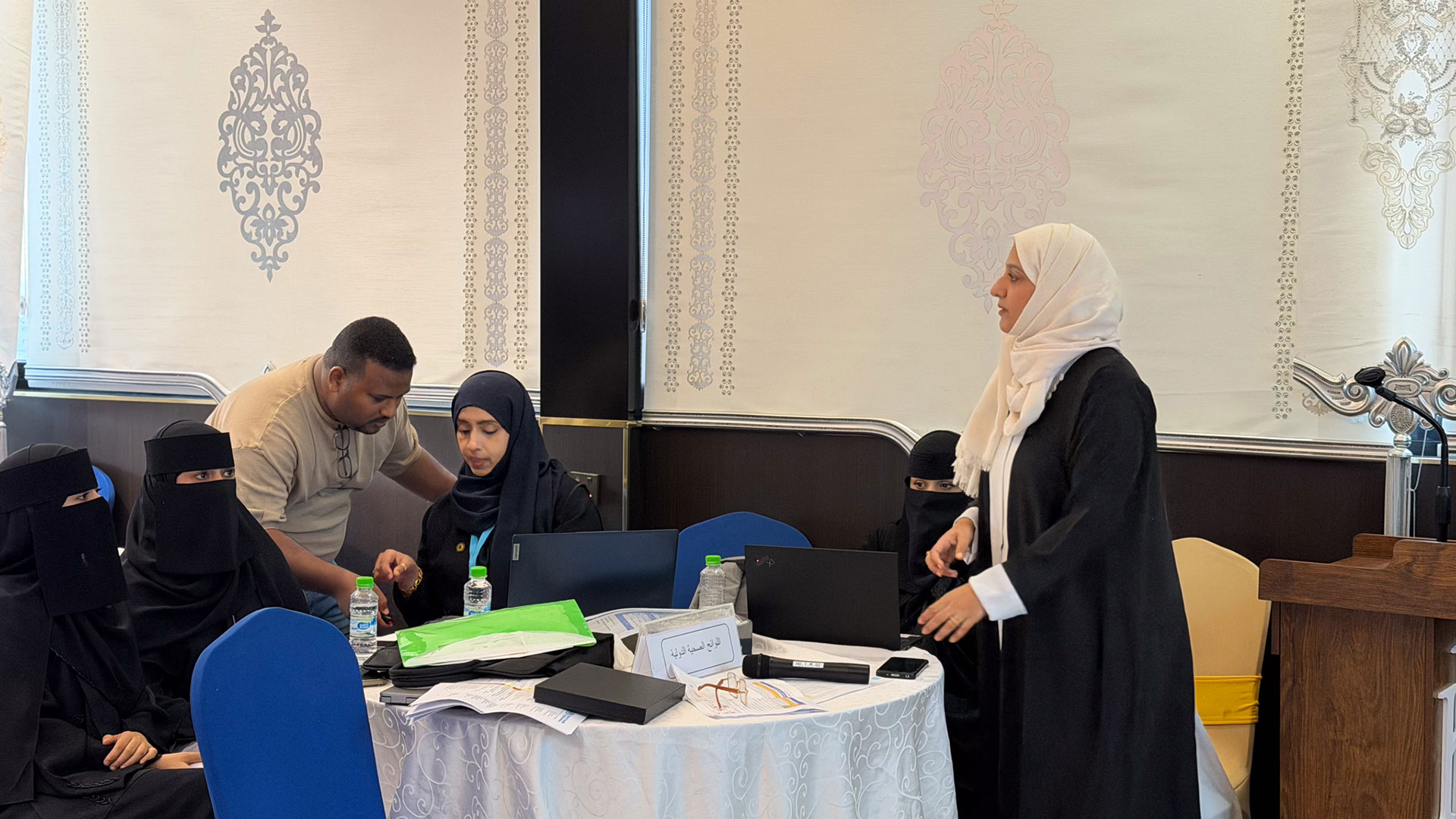 Technical groups review evidence and score Yemen’s core IHR capacities. Photo credit: WHO Yemen/Nesma Khan
Technical groups review evidence and score Yemen’s core IHR capacities. Photo credit: WHO Yemen/Nesma Khan
The workshop opened with plenary sessions introducing the SPAR 2025 methodology, indicators and scoring system, alongside a review of the 2024 results and recent amendments to the IHR. Facilitated technical working groups then examined evidence across all IHR core capacities, including surveillance, laboratories, health emergency management, infection prevention and control, risk communication and community engagement, points of entry, zoonotic diseases, food safety, chemical events and radiation emergencies.
Participants used structured discussions to assess current capacities, verify documentation, and reach consensus on evidence-based scores for each SPAR indicator. The process highlighted strong multisectoral collaboration essential for health emergency preparedness and response.
Key stakeholders from government ministries, public health institutions, laboratories, points of entry, emergency response agencies, and security and civil defense sectors participated actively, with WHO supporting the process through technical expertise and facilitation.
 Dr Entesar Jaber highlights national leadership and multisectoral collaboration to strengthen health security. Photo credit: WHO Yemen/Nesma Khan
Dr Entesar Jaber highlights national leadership and multisectoral collaboration to strengthen health security. Photo credit: WHO Yemen/Nesma Khan
By the end of the workshop, participants agreed on SPAR 2025 scores across all technical areas and documented the evidence underpinning each score. Key gaps, challenges and best practices were identified, alongside priority actions to guide future IHR capacity-strengthening efforts. A draft SPAR 2025 assessment report was compiled for final review by the national IHR focal point and subsequent submission in accordance with global reporting timelines.
This consultative process marks an important step in strengthening Yemen’s national health security, promoting coordinated action across sectors, and ensuring sustained progress in implementing the IHR.
Media contacts
WHO Yemen Communications
Email:
About WHO
Founded in 1948, the World Health Organization (WHO) is the United Nations agency dedicated to promoting health, keeping the world safe and serving the vulnerable. WHO leads global efforts to expand universal health coverage, coordinate responses to health emergencies and advance well-being for all.
World Health Organization appeals for urgent health funding to protect millions of lives in Yemen in 2026
12 February 2026, Aden, Yemen – The World Health Organization (WHO) is appealing for US$ 38.8 million to deliver life-saving emergency health assistance to 10.5 million people across Yemen in 2026, as the country enters another year of protracted conflict, disease outbreaks, climate shocks and deepening humanitarian needs.
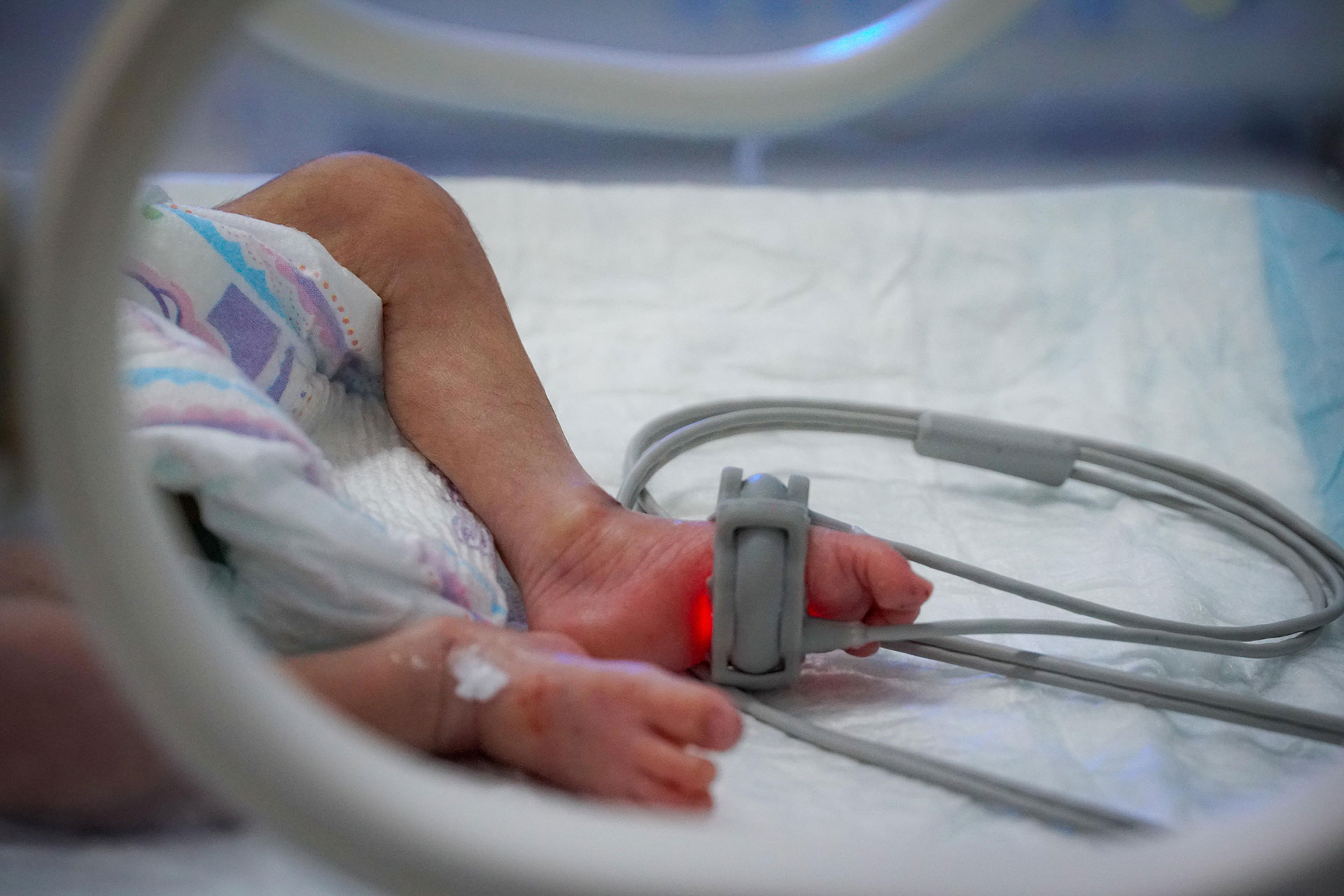 An infant inside an incubator. Photo credit: WHO Yemen/Nesma Khan
An infant inside an incubator. Photo credit: WHO Yemen/Nesma Khan
After more than a decade of crisis, Yemen continues to face one of the world’s most complex health emergencies. An estimated 23.1 million people require humanitarian assistance, while only around 60% of health facilities remain fully functional, leaving millions without reliable access to essential care.
“Yemen’s health system is stretched to its limits,” said Dr Syed Jaffar Hussain, WHO Representative and Head of Mission in Yemen. “Without sustained and timely funding, preventable diseases will spread unchecked, health facilities will be forced to scale down services, and the most vulnerable communities will pay the highest price.”
Yemen continues to experience multiple, concurrent disease outbreaks, including cholera, measles, dengue fever and polio, driven by low immunization coverage, unsafe water and sanitation, population displacement and limited access to care. Climate-related shocks, including floods and extreme weather, are intensifying transmission risks and damaging already fragile health infrastructure.
At the same time, acute malnutrition remains a major public health threat. Millions of children are affected, with hundreds of thousands facing severe acute malnutrition requiring urgent medical treatment. Without access to timely health and nutrition services, children remain highly vulnerable to preventable and life-threatening infections.
In 2026, under the Humanitarian Reset, WHO’s response in Yemen will prioritize life-saving and time-critical interventions in areas with the highest needs. Through its leadership of the Health Cluster, WHO will continue to strengthen disease surveillance and rapid response, ensure access to essential medicines and supplies, deploy mobile and surgical teams, support immunization campaigns, and build national capacity to sustain essential health services.
“Every delay in funding translates into lost opportunities to save lives,” Dr Hussain added. “This appeal is not only about responding to emergencies – it is about preserving the foundations of Yemen’s health system and preventing further human suffering.”
WHO calls on international partners and donors to urgently scale up support to ensure that critical health services remain available to communities across Yemen throughout 2026.
Related links
WHO Health Emergency Appeal for Yemen 2026
Media contacts
WHO Yemen Communications
Email:
About WHO
Founded in 1948, the World Health Organization (WHO) is the United Nations agency dedicated to promoting health, keeping the world safe and serving the vulnerable. WHO leads global efforts to expand universal health coverage, coordinate responses to health emergencies and advance well-being for all.
When every minute counts: Emergency trauma care saving lives in Marib and Taiz
11 February 2026, Aden, Yemen – In Yemen, emergencies arrive without warning – and often in numbers that overwhelm fragile health systems.
Across Marib and Taiz, hospitals are receiving a steady flow of patients injured by road traffic crashes, explosions and gunfire. Many arrive in critical condition. For them, survival depends on minutes: on whether trained teams are available, operating theatres are functional and essential supplies are within reach.
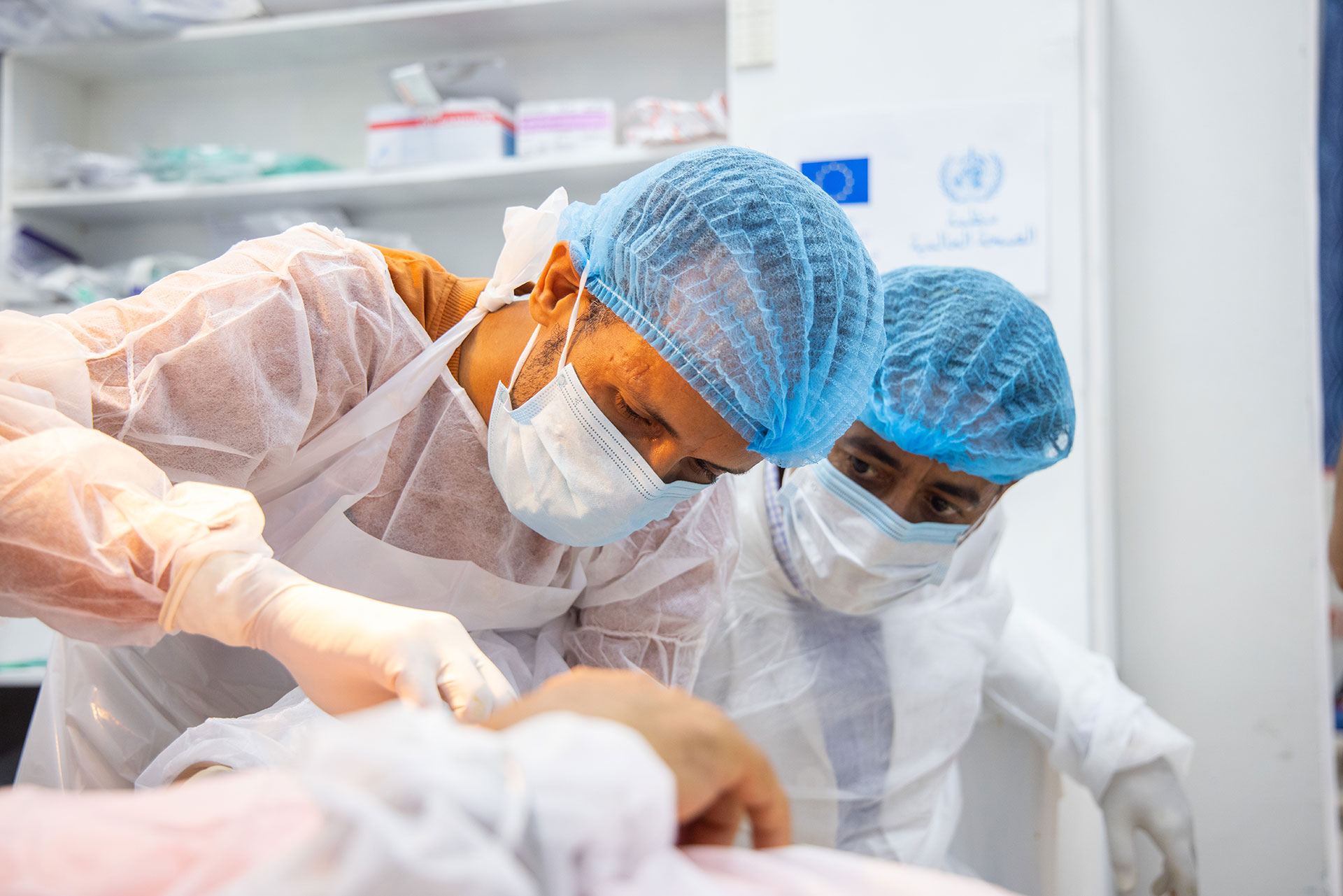 The medical team at Al-Thawarah Hospital performs a surgical operation, providing critical and lifesaving care to patients. Photo credit: WHO
The medical team at Al-Thawarah Hospital performs a surgical operation, providing critical and lifesaving care to patients. Photo credit: WHO
At Marib General Hospital, one of the country’s busiest referral facilities, trauma cases frequently arrive in waves. Dr Abdulrab Al-Salihi, a general surgery consultant who has worked at the hospital since its establishment, describes the pressure facing frontline teams: “Sometimes we receive 5 to 15 critical cases at the same time – from traffic accidents, explosions, or shootings. We must triage immediately and act fast to save lives.”
Marib now hosts one of the largest populations of internally displaced people in Yemen, placing extraordinary strain on already stretched health services. Despite these challenges, emergency surgeries continue around the clock – saving women, young adults and families arriving with little more than hope.
According to Abdulkareem Ali Hussein Hamid, Acting Chairman of the Marib Hospital Authority, recent support has made a tangible difference in how emergencies are managed. He explains that the presence of supported surgical teams has reduced waiting times and improved staff efficiency in handling complex and critical cases, strengthening the hospital’s overall emergency response capacity.
These gains are being sustained through strengthened emergency systems supported by the World Health Organization (WHO), with funding from the European Civil Protection and Humanitarian Aid Operations (ECHO), helping ensure that operating theatres remain functional and life-saving care continues when it is needed most.
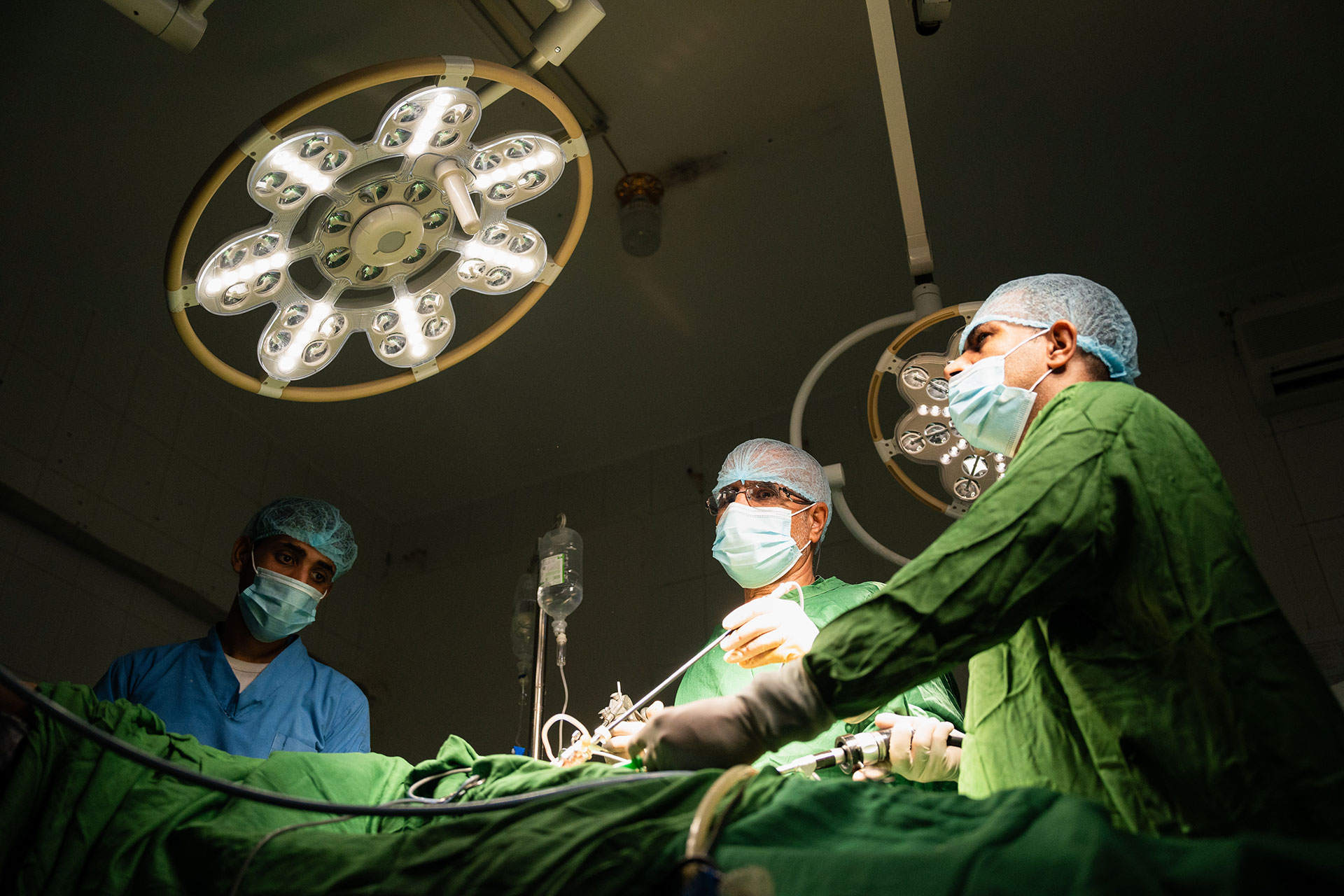 Doctors perform an endoscopy procedure on a patient, carefully examining the internal organs. They work together to ensure the procedure is safe, while monitoring the patient’s condition throughout. Photo credit: WHO
Doctors perform an endoscopy procedure on a patient, carefully examining the internal organs. They work together to ensure the procedure is safe, while monitoring the patient’s condition throughout. Photo credit: WHO
Between October and December 2025, this support translated into tangible, life-saving impact across three referral hospitals—Al Thawrah and Al Gamhouri hospitals in Taiz, and Marib General Hospital. More than 700 surgical procedures were performed, restoring mobility and saving lives, while 3,572 patients received critical consultations, triaging, and timely care. For frontline staff, however, impact is not measured in numbers alone, but in lives touched. Salma Abdulilah Abdullah Shard, a pharmacist at Marib General Hospital, recalls a moment that continues to define her work: “A child was brought to the emergency room with no heartbeat. The team continued resuscitation for more than 40 minutes. When the heartbeat returned, it felt as if life itself had been restored.”
Hundreds of kilometres away, the same urgency defines care at Al-Thawra General Hospital in Taiz. Once severely damaged by years of conflict – some facilities losing up to 80–90% of their capacity – the hospital is gradually restoring emergency and surgical services and now serves patients from four neighbouring governorates.
For patients, the impact of improved emergency care is immediate and deeply personal. Ibrahim Ali Ghaleb, who was rushed to Al-Thawra Hospital after a serious road accident, recalls the speed and coordination of the response: “All the doctors came immediately and worked as one team. I was treated, taken to surgery and cared for without neglect. This hospital saves lives and needs continued support.”
Across both Marib and Taiz, emergency trauma care remains fragile – but operational. Surgeons work through the night, pharmacists manage scarce supplies and generators keep operating theatres running during power cuts.
With ECHO’s support, these hospitals are not only responding to emergencies – they are restoring trust, dignity and the chance of survival for people injured by conflict and displacement.
In a country where every minute can decide a life, this support is not optional.
It is lifesaving.
Reaching the unreachable: accelerating onchocerciasis elimination in Yemen
04 February 2026, Aden, Yemen – In Yemen’s remote high-altitude valleys, communities have lived for generations with sowda, a severe form of onchocerciasis (commonly known as “river blindness”), that causes debilitating skin disease, stigma and long-term suffering. Years of conflict, rugged terrain and chronic funding gaps have left many families without access to treatment.
 Door-to-door treatment brings lifesaving onchocerciasis prevention to remote communities in Yemen. Photo credit: WHO/Yemen
Door-to-door treatment brings lifesaving onchocerciasis prevention to remote communities in Yemen. Photo credit: WHO/Yemen
In 2025, that reality began to change. Under the leadership of the Ministry of Public Health and Population, and with technical and operational support from WHO, Yemen implemented one of its most ambitious onchocerciasis mass drug administration (MDA) campaigns yet – reaching populations long considered unreachable.
Reflecting on this shift, Dr Ali Al-Waleedi, Deputy Minister for the Primary Health Care Sector, observes that for decades entire families had lived with sowda without ever receiving treatment. He says the campaign fundamentally changed that reality, as health teams crossed mountains, facing insecurity and isolation, to reach every household – demonstrating that no community in Yemen is unreachable when commitment and the right strategy come together.
In December 2025, WHO supported the Ministry of Public Health and Population to redesign the MDA approach, moving from static distribution points to an intensive door-to-door strategy across 10 high-priority districts in Hajjah and Al-Mahweet governorates and 6 highly-endemic districts of Taiz governorate. Despite the difficult terrain and insecurity, the adapted approach achieved full geographical access, reaching 91% population coverage in Hajjah and Al-Mahweet and 86.5% in Taiz – well above the WHO-recommended 80% threshold for effective disease control.
Community leadership proved decisive. Dr Ahmed Thabit, National Professional Officer at WHO Yemen, highlights that the campaign was driven by communities themselves. With WHO’s guidance, local volunteers – especially women – became the backbone of implementation, building trust, entering homes that had never been reached before and ensuring every dose protected a life. In Hajjah and Al-Mahweet, 419 community health volunteers, more than half of them women, safely administered over 732 000 donated Mectizan® tablets, protecting hundreds of thousands of people from infection.
Sustaining these gains amid shrinking resources was equally critical. Earlier, in September 2025, WHO had worked closely with the Ministry of Public Health and Population and partners to prevent a dangerous interruption of MDA activities in the 6 highly-endemic districts of Taiz. Dr Nasreen, Director of the Negelected Tropical Disease Programme at the Minsitry, notes that at a time when funding gaps threatened to reverse years of progress, maintaining treatment was essential to prevent resurgence. By optimizing limited resources and using 470 179 donated Mectizan® tablets, the campaign safeguarded hard-won gains and kept Yemen on track toward eliminating onchocerciasis as a public health problem by 2030.
Together, these efforts show that elimination is possible – even in conflict-affected and resource-constrained settings. By adapting delivery strategies, empowering communities and sustaining partnerships, WHO and the Ministry of Public Health and Population continue to translate global commitments into life-changing impact for Yemen’s most vulnerable populations.
These achievements prove that with targeted investment, adaptive strategies and community leadership, even the most complex challenges can be overcome. By sustaining treatment, empowering volunteers and protecting hard-won gains, WHO and the Ministry of Public Health and Population are keeping Yemen on track to eliminate onchocerciasis as a public health problem by 2030. Continued financial support from partners – through the integration of vector control and MDA activities for all neglected tropical diseases – is critical to ensure that progress is not only maintained but accelerated until elimination is reached.
World NTD Day 2026: Unite. Act. Eliminate.
WHO urges sustained commitment to protect progress against neglected tropical diseases in Yemen
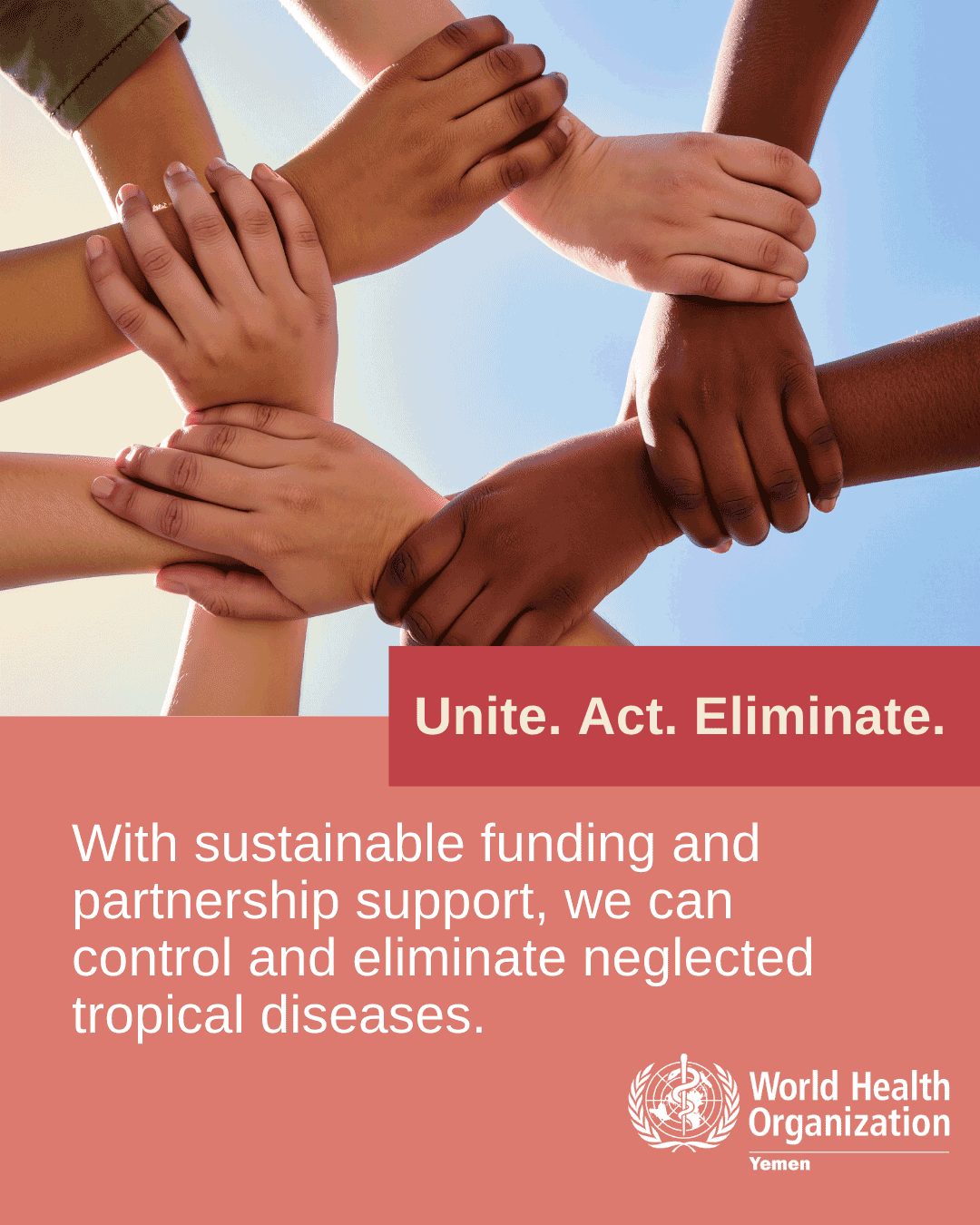 30 January 2026 – Aden, Yemen – On World Neglected Tropical Diseases (NTD) Day 2026, marked under the theme “Unite. Act. Eliminate.”, the World Health Organization (WHO) in Yemen renews its call for collective action to end NTDs as a cornerstone of health equity, resilience and sustainable development.
30 January 2026 – Aden, Yemen – On World Neglected Tropical Diseases (NTD) Day 2026, marked under the theme “Unite. Act. Eliminate.”, the World Health Organization (WHO) in Yemen renews its call for collective action to end NTDs as a cornerstone of health equity, resilience and sustainable development.
NTDs continue to affect more than 1 billion people globally. In Yemen, diseases such as leishmaniasis, schistosomiasis, leprosy, trachoma and dengue fever remain deeply entrenched in the most vulnerable communities. Years of protracted conflict, repeated climate shocks and a severely fragmented health system have intensified exposure to these diseases and constrained access to timely prevention, diagnosis and treatment.
Despite these challenges, global experience shows that elimination is achievable. By 2024, the number of people worldwide requiring NTD treatment declined to 1.4 billion, representing a 36% reduction since 2010. As the world enters 2026, 58 countries have eliminated at least one NTD, demonstrating tangible progress towards WHO’s 2030 target of 100 countries achieving elimination.
Yemen now stands at a critical crossroads. Sharp reductions in global health financing risk undermining more than a decade of progress against NTDs. Underfunded programmes do not merely slow momentum: they create conditions for disease resurgence, threatening lives, livelihoods, and economic stability – particularly among marginalized populations already bearing the brunt of conflict and poverty.
Dr Syed Jaffar Hussain, WHO Representative to Yemen, underscored the urgency of sustained commitment, stating: “Neglected tropical diseases thrive where health systems are weakest and communities are most vulnerable. In Yemen, progress against NTDs has shown that even in the most challenging settings, elimination is possible when commitment, funding and partnerships are sustained. Turning away now would not only reverse years of hard-won gains, but would condemn communities to entirely preventable suffering. Protecting the most vulnerable is not optional – it is our shared responsibility.”
Investing in NTD programmes remains one of the most cost-effective public health interventions. Evidence shows that preventive treatment and early care avert lifelong disability, protect children’s education, sustain adult productivity and strengthen primary health care from the ground up. In fragile and conflict-affected settings such as Yemen, these programmes also act as economic stabilizers, safeguarding human capital while reinforcing national health systems.
Climate change and ongoing conflict further compound the risk. Rising temperatures, flooding, population displacement and weakened infrastructure create ideal conditions for disease transmission. Without sustained investment, the gains achieved over the past decade could be rapidly erased.
On this World NTD Day, WHO calls on national authorities, donors and international partners to move beyond short-term emergency responses and commit to integrated, sustainable solutions. Maintaining funding for existing programmes, embedding NTD services within Yemen’s national health strategy and advancing a clear pathway toward greater domestic ownership are essential to securing progress and preventing resurgence.
By uniting behind these priorities today, Yemen can protect hard-won gains, accelerate progress toward elimination and build a healthier, more resilient future for its people.
For media inquiries, please contact:
WHO Yemen Communications
Email:
About WHO
Since 1948, the World Health Organization (WHO) has been the United Nations agency dedicated to advancing health for all, so that everyone, everywhere can attain the highest level of health. WHO leads global efforts to expand universal health coverage, direct and coordinate the world’s responses to health emergencies and connect nations, partners and people to promote health, keep the world safe and serve the vulnerable.
Restoring dignity and safety through WASH – a new chapter for Marib and Matna hospitals
12 January 2026, Aden, Yemen – For years, stepping into Marib General Hospital meant entering a place fighting its own battles. Overcrowded corridors. Walls swollen with humidity. Bathrooms that constantly leaked or clogged. Floors cracked from overuse. Air heavy with the weight of too many patients and too few functional systems.
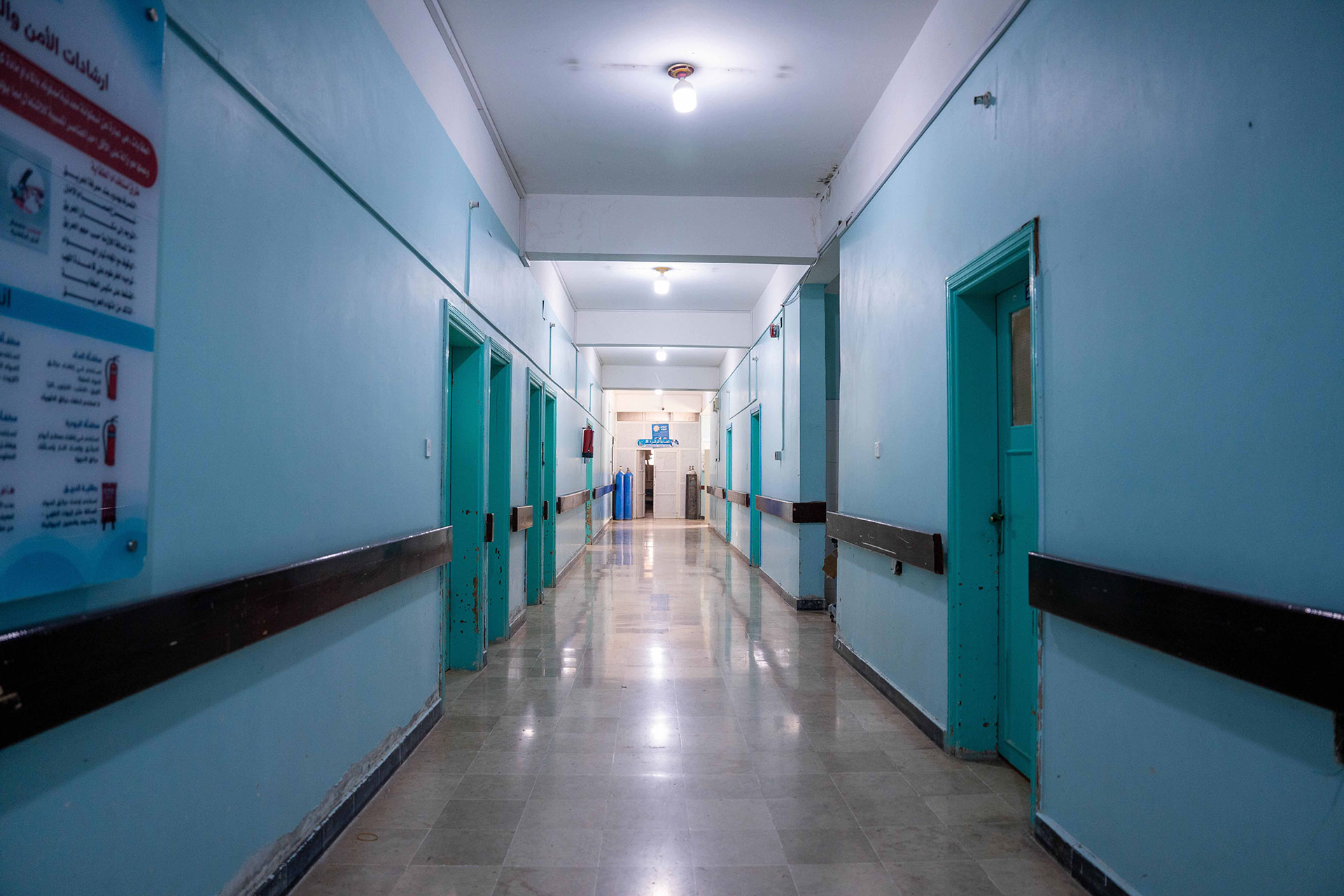 The hospital corridors are in poor condition, with peeling paint. Photo credit: WHO Yemen
The hospital corridors are in poor condition, with peeling paint. Photo credit: WHO Yemen
It was a hospital doing its best – but one, where the environment itself worked against healing.
“Before the renovation, we faced constant humidity, water leaks and malfunctioning bathrooms,” recalls Abdulkarim Abdulhussein, Director of Marib General Hospital Authority.
“These issues affected medical services and even the psychological well-being of patients.” Yet thousands continued to walk through its doors, because they had nowhere else to go.
A transformation families can feel
Today that reality has changed – profoundly.
With generous support from King Salman Humanitarian Aid & Relief Centre, and in close partnership with the Ministry of Public Health and Population, WHO restored not just buildings but the sense of dignity and safety that families in Yemen have long deserved.
 Exterior view of the hospital building, showing the main structure and surrounding area with the signboard of Ksrelief. Photo credit: WHO Yemen
Exterior view of the hospital building, showing the main structure and surrounding area with the signboard of Ksrelief. Photo credit: WHO Yemen
Across Marib and Matna hospitals, WASH rehabilitation has brought:
- modern, disability-inclusive restrooms
- reliable water systems built to withstand pressure
- clean, restored floors and walls
- sanitation systems that actually protect health
- proper ventilation and functioning air-conditioning
- infection-prevention upgrades in high-risk areas.
These improvements are more than infrastructure – they are a lifeline.
“The difference is very significant,” says Hussain, a long-time patient. “Before, we had to look for several hospitals to meet our needs. Now everything is here – better equipment, better services, better specialists and a clean environment.”
A hospital reborn in the eyes of its community
For patients like Ibrahim, who brings his family for treatment every few months, the change is immediate, visible and deeply felt.
“The renovations to the floors, walls and bathrooms created a real transformation,” he shares.
Families now walk into spaces that feel clean and safe, not stressful and uncertain.
On the frontlines: a safer emergency room
 Improved hospital corridors following rehabilitation and painting works. Photo credit: WHO Yemen
Improved hospital corridors following rehabilitation and painting works. Photo credit: WHO Yemen
Inside one of Yemen’s busiest emergency departments, where 150 to 300 patients arrive every single day, the transformation has been lifesaving.
“Upgrading the sanitation system, installing hand-washing stations and adding epoxy floors made our work faster and safer,” explains Dr Malik Al-Faqih, Head of Emergency. “It improved the environment for patients, visitors and staff.”
For doctors treating war injuries, trauma cases and critical patients, a clean and organized environment is not a luxury – it is the difference between risk and safety, between delay and survival.
More than renovation – a renewal of trust
The impact of the WASH upgrades extends far beyond physical improvements. It restored something fragile, yet essential: trust.
Trust that a hospital can be a place of healing, not harm.
Trust that families can enter with fear and leave with relief.
Trust that health workers have the environment they need to save lives.
“This project created a positive impression among all patients,” says Director Abdulkarim. “It improved the working environment and the quality of health care we provide.”
A foundation for hope
Challenges remain – overcrowding, the need for expanded clinics and growing demand from a displaced population. But the WASH rehabilitation has already rewritten the daily experience of thousands.
 Doctor checks the patient and carefully place a feeding tube to ensure proper nutrition and medical care. Photo credit: WHO Yemen
Doctor checks the patient and carefully place a feeding tube to ensure proper nutrition and medical care. Photo credit: WHO Yemen
Clean water now flows where it once barely reached.
Bathrooms are accessible, functional and safe.
Walls no longer leak; floors no longer pose infection risks.
Health workers stand taller, supported by a system that supports them back.
This transformation is more than a project. It is a promise fulfilled: that every person deserves dignity, safety and quality care.
It is a reminder that even in the most challenging contexts, rebuilding begins with restoring the basics – water, sanitation and the simple human right to heal in safety.
All of it made possible through the generous support of King Salman Humanitarian Aid & Relief Centre, whose contribution helped turn a long-standing struggle into a story of renewal and restored dignity.
To know more about the WASH project, read the full press release below:
WHO strengthens the energy resilience of Yemeni health facilities with support from the Kuwait Fund for Arab Economic Development
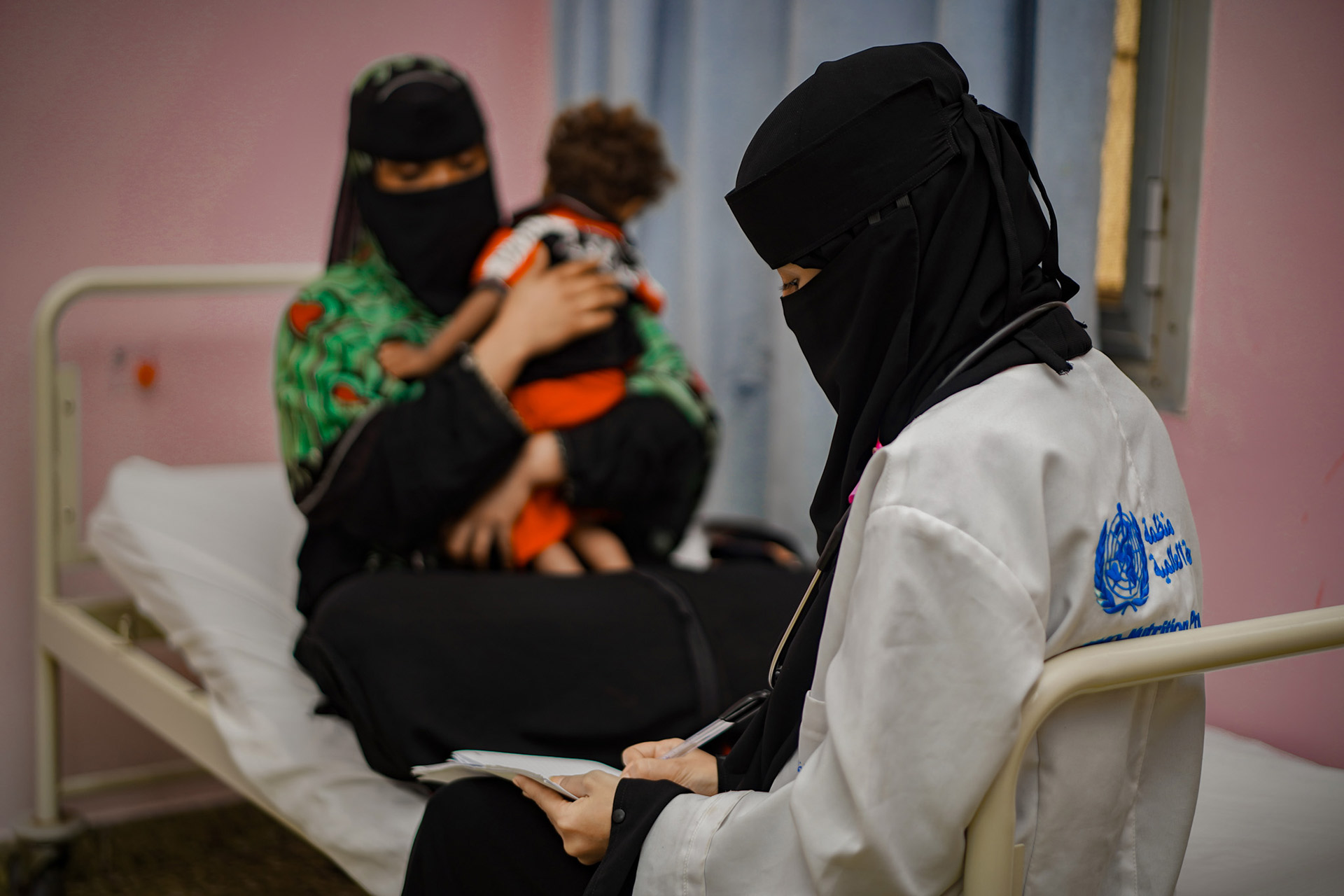 06 November 2025, Aden, Yemen – With generous funding from the Kuwait Fund for Arab Economic Development (KFAED), the World Health Organization (WHO) is launching a new project to strengthen the energy resilience of Yemen’s health sector through the installation of solar energy systems and battery storage in 6 health facilities across the country.
06 November 2025, Aden, Yemen – With generous funding from the Kuwait Fund for Arab Economic Development (KFAED), the World Health Organization (WHO) is launching a new project to strengthen the energy resilience of Yemen’s health sector through the installation of solar energy systems and battery storage in 6 health facilities across the country.
Frequent power cuts severely disrupt the delivery of lifesaving health services across Yemen. The new KFAED-funded initiative will help ensure continuous and sustainable power for hospitals and primary health care facilities, enabling operating theatres, intensive care units and vaccine cold chains to function without interruption.
Through this 12-month project, WHO will:
- install solar photovoltaic systems and battery storage units in 6 health facilities in priority governorates;
- provide technical support and capacity-building to health staff and maintenance teams for effective system operation and sustainability;
- strengthen climate resilience and the environmental sustainability of Yemen’s health infrastructure; and
- provide technical support to undertake energy needs assessments and identify additional facilities that could benefit from renewable energy resources, increasing climate resilience and reducing carbon emissions
A step toward climate-resilient health systems
“Reliable electricity is the backbone of every functioning health facility,” said WHO Representative in Yemen Dr Syed Jaffer Hussain. “Through the generous support of the Kuwait Fund, WHO is helping ensure that health services remain uninterrupted even during power outages, protecting lives, improving service quality and contributing to a greener, more resilient health system in Yemen.”
The project complements WHO’s broader efforts to integrate renewable energy solutions into Yemen’s health facilities, reduce operational costs and ensure that vulnerable communities can continue to access essential medical care despite ongoing crises and climate challenges.
WHO expresses its gratitude to the Government and people of Kuwait and the Kuwait Fund for Arab Economic Development for their steadfast partnership and support of the health sector in Yemen. This collaboration builds on Kuwait’s longstanding commitment to humanitarian and development assistance, particularly in health, infrastructure and energy.
About WHO
Since 1948, the World Health Organization (WHO) has been the United Nations agency dedicated to advancing health for all, so that everyone, everywhere can attain the highest level of health. WHO leads global efforts to expand universal health coverage, direct and coordinate the world’s responses to health emergencies and connect nations, partners and people to promote health, keep the world safe and serve the vulnerable.
Media contacts
WHO Yemen Communications:








